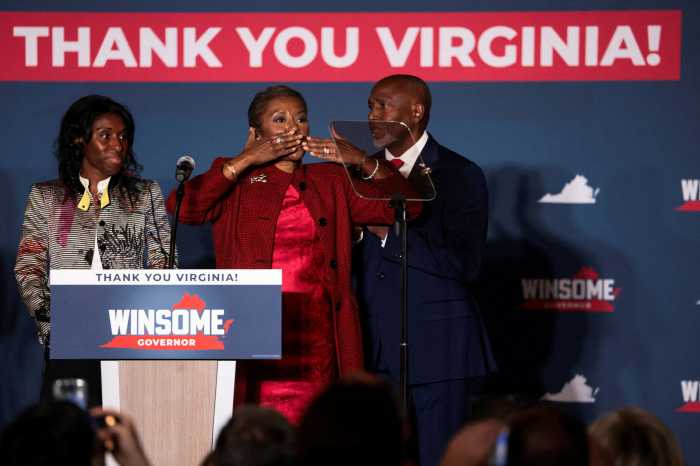It could have been a race in which the two candidates battled to a draw, or nearly so, for the support of gay advocacy groups across the city. Liz Krueger, the East Side Democratic State Senate incumbent––but just barely, having first been elected this past February––has been a strong supporter of LGBT rights and a vigorous public response to the AIDS crisis throughout her career as a community services advocate. Though she lost the Empire State Pride Agenda (ESPA) endorsement to another gay rights supporter, veteran Republican Assemblymember John Ravitz, in the special election earlier this year, she now has the Pride Agenda nod in her run for a full term. Republican Andrew Eristoff, who served Mayor Rudy Giuliani as finance commissioner, also has a friendly history with the LGBT community, having won ESPA’s endorsement in all three of his successful races in the ‘90s for the City Council. A player in the 1998 passage of the comprehensive domestic partnership law benefiting city workers, Eristoff shares Krueger’s cutting edge views on key LGBT issues, including support for both civil unions and gay marriage. Yet, despite this level playing field, Eristoff, in the past two weeks, has ignited a media firestorm that has brought gay rights advocates and AIDS experts off the bench in a big way in support of Krueger. In a four-color print mailing followed up by television spots, Eristoff charged Krueger with insensitivity to the needs of women who are raped because of her vote against a measure that would allow victims to demand HIV testing of their alleged attackers prior to trial. The campaign pamphlet is titled “Haven’t Raped Women Been Victimized Enough?” and ends with large lettering asserting, “When the time came for Liz Krueger to stand up for rape victims, she stood with their attackers.” In a race in which the two candidates share many positions and the debate has often boiled down to who can better and more effectively represent a district that runs from 19th Street to the 90s, from the East River as far west as Eighth Avenue in Chelsea, Eristoff hopes to make his disagreement with Krueger on the testing measure a litmus test. “We differ on other matters of substance, and I can think of no more important example than our respective approaches to the complex question of court-ordered testing of rape defendants for sexually transmitted diseases,” Eristoff told Gay City News in an interview just days after his mailing hit the streets. Despite Eristoff’ characterization of the issue as “complex,” long time advocates for LGBT rights stepped up to suggest that the Republican’s framing of the issue was simplistic, even demagogic. And they were joined by AIDS advocates who disputed the public health conclusions Eristoff asserted. “We are stunned by Andrew Eristoff’s attack mailing and television advertisements,” ESPA’s executive director Matt Foreman said at an October 7 press conference called to respond to the attack on Krueger. “Up to this point, we have known him to be a strong supporter of our core issues. I have informed him of our dismay, disappointment, and anger.” Gay Men’s Health Crisis, which as a non-profit organization that receives government funding is barred from endorsing candidates, did not comment directly on the mailing, but did use the occasion of the Krueger press conference to issue a written statement reiterating its opposition to the bill the Republican was advocating. “Gay Men’s Health Crisis continues to oppose NYS Senate bill 7419 as a misguided approach toward addressing the legitimate rights and real concerns of survivors of violent felonies, including rape,” the statement read. “GMHC opposes the bill because it does not address rape survivors’ immediate health needs, does not provide real treatment options, and in fact could serve as a deterrent for those survivors to adhere to appropriate treatment recommendations.” The GMHC statement said that if a rape victim believes that they might have been infected with HIV, post-exposure prophylactic treatment (PEP) should be given as quickly as possible––ideally within an hour or two of exposure, but no later than 72 hours. As a result, a victim cannot wait for test results from a perpetrator, who may or may not even be in custody. Even after a perpetrator is tested, the risk that of a false negative or of an infection that is not yet detectable makes a victim’s reliance on the results risky. Eristoff rejected the analysis by critics of his position. Asked about the assertion by GMHC and other AIDS experts that PEP must begin promptly to be effective and definitely within the first three days, he told Gay City News, “No, I’ve not read that limitation.” And Eristoff clearly believes that the fine points of the medicine are to some degree beside the point. “Where is the harm?,” he asked. “[Rape victims] will have been counseled that they need to be tested themselves regardless of the results on the first person, so I don’t buy that. You’re saying the medical case isn’t as clear as I’m making it out to be. I’m saying I actually don’t agree with that and, in any event, and––it is outside the range of my immediate knowledge––but let’s say GMHC is correct .You could prophylactically start within hours of being attacked. Test results come back negative [on the perpetrator], you and your doctor may decide that because of test results or other circumstances, you are going to discontinue the treatment.” Out gay Democratic State Senator Tom Duane, not surprisingly, is among Eristoff’s toughest critics on the HIV testing matter. In an press release, Duane wrote, “I would hate to see a victim of a horrendous crime be victimized twice by contracting HIV/AIDS because they detrimentally relied on a criminal defendant’s negative test.” But, Eristoff is not framing his attack on Krueger based on a medical disagreement, but rather on what he terms the incumbent’s “reflexively ideological approach to public policy,” in this case on the issue of the accused’s civil liberties. “I think she applied an ideological framework to an issue that required judgment and a careful weighing of the facts and the different issues involved,” he argued. Casting Krueger as a lefty requires deftness on Eristoff’s part as he portrays himself as a “moderate progressive” more attuned to the Manhattan district. Arguing that he is needed as a Republican voice on urban issues in the State Senate with a lopsided G.O.P. majority, Eristoff said, “It’s not always partisan or ideological. There’s also a big dose of regionalism in there.” In recent years, new Democrats elected to the State Senate––including Krueger, Duane, and the West Side’s Eric Schneiderman––have argued that the G.O.P. only moves on progressive issues, like hate crimes, gay rights, and women’s health, when faced by fierce competition at the ballot box by the minority Democrats. Schneiderman, in a recent interview for example, heartily seconded Krueger’s contention that her election in February pushed the Senate leadership to finally allow passage of the Women’s Health and Wellness measure first proposed by out lesbian Assemblymember Deborah Glick (D-West Village). Eristoff heatedly disputed that assertion. “Frankly, I think it is a little far-fetched to say that Krueger can take credit for the Women’s Health and Wellness Act when I actually know the dynamics of many of the actors involved and I know that she had absolutely no impact on that happening,” he told Gay City News. “It’s nice for Senator Schneiderman to be quoted in the paper taking credit on her behalf, but that doesn’t make it true.” In the same vein, Eristoff argued that further Democratic pressure will not be needed to push the Senate to pass the Sexual Orientation Non Discrimination Act (SONDA) despite the Governor George Pataki’s failure to meet his pledge of delivering the law in the legislative session that ended in June. “It will pass,” Eristoff predicted confidently. “Whatever else anyone says about [Senate Majority Leader Joe] Bruno, the man has made a commitment, and it will happen. He prides himself on following through.” From Eristoff’s perspective, Albany is not a partisan battleground where New York City’s interests can only be advanced by more assertive Democrats. It’s a place where New York City interests, and urban concerns generally, need better articulation in both parties. In the Senate, where the Republicans run the show and will continue to for the foreseeable future, he believes that he will be the more effective voice. “I would say there are plenty of Democrats from New York City,” Eristoff said. “I’ve told people that I think Liz Krueger would be a great West Side Democrat. The Senate is chockablock full of Democrats from New York, as well of course is the Assembly. It’s not as if those points of views are not being represented… So are we better off with one more voice basically whistling in the wind or are we collectively better off with a progressive Republican who is committed to working within the majority for issues of concern to the City of New York?”
LGBTQ+ events in NYC
Tomorrow, 7:30 pm
Nov. 15, 9:30 am
Nov. 30, 1 pm












